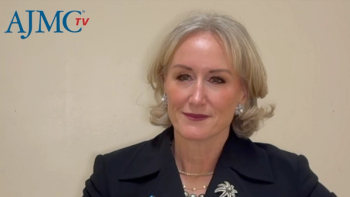
Treatment Options in Metastatic TNBC
Examining the use of sacituzumab govitecan and AKT inhibitors as therapy options for the treatment of metastatic triple-negative breast cancer.
Transcript
Hope S. Rugo, MD: There are a number of other therapies of course that we’re investigating for triple-negative disease in the metastatic setting, and it’s good to have some additional options at least that are in the pipeline. Claudine, do you want to mention some of these, particularly the antibody-drug conjugate, sacituzumab govitecan?
Claudine J. Isaacs, MD: What we’ve seen so far on the results from sacituzumab are really based on a phase 2 trial, but there is a large phase 3 randomized trial where we’re awaiting the results as comparing with treatment of physician choice and in patients who received 2 to 4 prior chemotherapies for metastatic triple-negative breast cancer. But in the phase 2 trial where the data were published, I think in 2017 or 2018, it showed very impressive response rates in patients who had had significant prior treatment with triple-negative breast cancer.
The objective response rate was just over 30% in that group of patients, and the other thing that was notable here is there was a fairly prolonged duration of response in those patients. If you think of it again, this is a triple-negative-disease patient population who received multiple prior therapies, and the clinical benefit rate that included patients who had stable disease for up to 6 months was about 46%. There is a great deal of enthusiasm about this drug. We’re all eagerly awaiting the results of the phase 3 trial to be able to really see how this drug performs and hopefully have it available to us.
Hope S. Rugo, MD: It’s an interesting agent because this toxin is SN-38, which is the active metabolite of irinotecan. We’re also targeting TOP1, which is interesting because we haven’t done much in this area before in breast cancer. The data from the triple-negative single-arm group has been looked at in a number of ways, but these patients were heavily pretreated. The ASCENT trial that you were talking about has completed accrual, and so we’re hoping to see data in the not-too-distant future.
Even more exciting for all of us is that we’re hoping to hear something from the FDA on the accelerated approval of sacituzumab govitecan in the next few months. That may make the agent available for our patients earlier. Then there’s a trial ongoing in patients with hormone receptor–positive disease called TROPICS-02, which is randomizing patients to receive sacituzumab or chemotherapy of physician choice. Go ahead, Claudine.
Claudine J. Isaacs, MD: I just wanted to say 1 quick thing. For those of us who have had experience with this drug on clinical trials, there has been an impressive response in a number of patients, which is what is driving all of us to be very eager for the accelerated approval for this drug to be able to offer our patients.
Hope S. Rugo, MD: Absolutely. There are also other agents that are being tested. Certainly, there’s been interest in AKT inhibitors. Priyanka, I know you’ve done some work with PI3 kinase inhibitors. Maybe just mention the AKT inhibitor trials?
Priyanka Sharma, MD: We’ve now had 2 randomized phase 2 trials and…breast cancer in the first-line setting mainly that demonstrated benefit of adding an AKT inhibitor to a taxane backbone. Both of those 2 trials have led to development and initiation of phase 3 trials with paclitaxel with or without an AKT inhibitor, either ipatasertib or capivasertib. They’re taking different approaches. Some trials are restricting you to biomarkers for a select population—those that have mutations in the PI3 kinase AKT pathway—and the others are more open in terms of taking all comers in the first-line setting. An important area of future research is going to be trying to figure out the role of immune checkpoint inhibition versus these targeted agents in the first-line setting when we are using a taxane backbone. Hopefully some of these ongoing studies will answer those questions.
Newsletter
Stay ahead of policy, cost, and value—subscribe to AJMC for expert insights at the intersection of clinical care and health economics.








